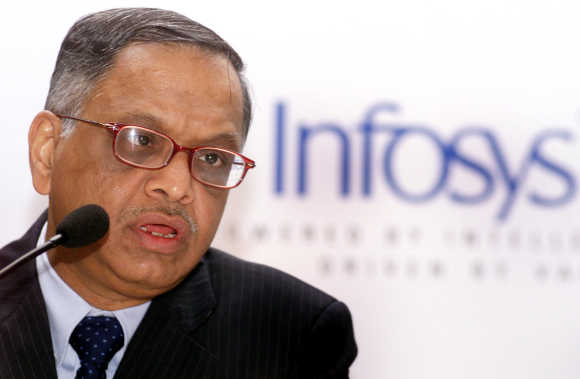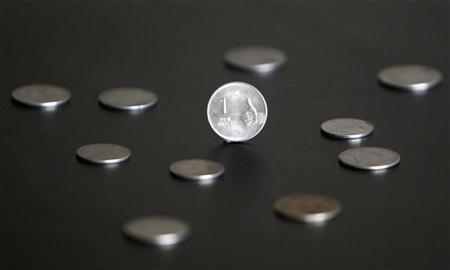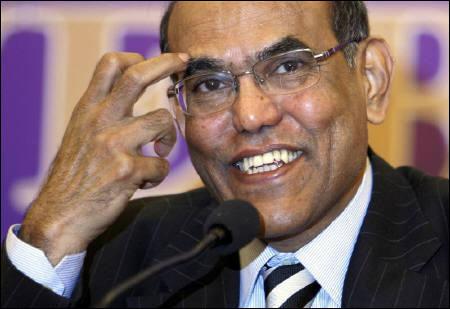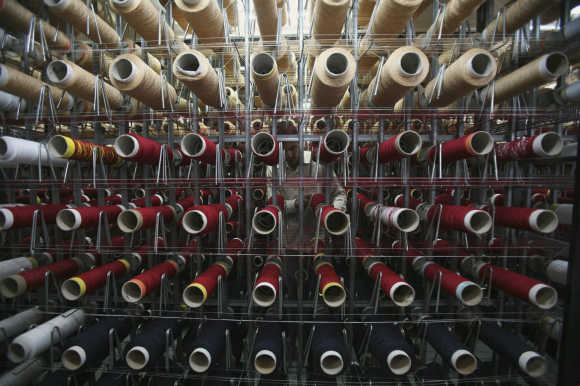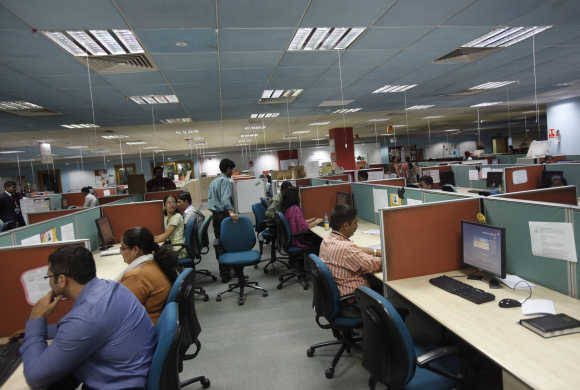 | « Back to article | Print this article |
India Inc holds on to its cash
'Cash is king' is an old expression and Indian companies seem to be following it to a tee.
Sample this: 10 Indian companies are holding as much as Rs 2.34 lakh crore (Rs 2.34 trillion).
The companies include Reliance Industries, Infosys, Coal India, Cairn India and ONGC, among others.
Almost one-third the amount, or Rs 70,252 crore (Rs 702.52 billion), is held by just one company -- RIL.
The amount is 19.5 per cent of the company's annual revenue.
Click NEXT to read further. . .
India Inc holds on to its cash
Infosys' Rs 20,591-crore or Rs 205.91 billion (around $4-billion) cash represents 61 per cent of the company's sales for the year.
Oil India was sitting on Rs 12,589 crore (Rs 125.89 billion) of cash and cash equivalent in September itself.
The number at 134.9 per cent exceeded its sales substantially.
No wonder, analysts are beginning to ask questions. While CLSA has written an open letter to Infosys CEO S D Shibulal, others are asking companies like RIL and ONGC how they wish to deploy their cash.
"One of the reasons why large companies are holding cash is because they are unable to identify large projects and are, hence, unable to execute it fast enough.
Click NEXT to read further. . .
India Inc holds on to its cash
"I don't think it is a good idea to hold too much cash because the return on equity is reduced.
"They should look at investing instead, or go for buybacks or give better dividends. This applies to public sector companies, too," said Rakesh Arora, managing director at Macquarie Capital Securities (India).
Globally, companies with cash often use it to buy back shares or go for acquisitions. RIL has recently announced a buyback of Rs 10,000 crore (Rs 100 billion).
Interestingly, RIL has debt almost equal to its cash and cash equivalent.
On debt dues of Rs 68,259 crore (Rs 682.59 billion), it pays interest of Rs 2,667 crore (Rs 26.67 billion).
While on a cash and cash equivalent of Rs 70,252 crore (Rs 702.52 billion), the company earns Rs 4,414 crore (Rs 44.14 billion).
Then, there is Infosys.
Click NEXT to read further. . .
India Inc holds on to its cash
"At over $4.1 billion, Infosys' cash balance has multiplied 12 times in the last nine years.
"A number of reasons drive me to believe that cash accumulation is value-dilutive for shareholders and returning cash (either through dividends or buybacks) would be the correct thing to do.
Cash on Infosys' books is earning just a six-seven per cent yield, with implied cost of equity of 12-13 per cent.
Infosys' return on equity has also deteriorated significantly (down 15 percentage points over FY 06-12) due to this cash accumulation.
This implies the benefits of the high margins Infosys has are not seeping down to shareholders due to its unwillingness to pay out the cash," said Nimish Joshi in his report.
But, Infosys CFO V Balakrishnan believes holding on to cash makes sense.
"It is a very interesting problem to have. Cash is a good thing to have, since we have seen volatility, economic uncertainty and changes in technology.
Click NEXT to read further. . .
India Inc holds on to its cash
When you have more cash, your ability to reinvest and come back to growth is very high. If we do not find the use for a longer term, probably we will look at paying back but not now," said he, adding that cash was needed for possible acquisition targets as well.
Mohandas Pai, chairman, Manipal Global Education Services, and a former board of director of Infosys, said in the case of IT firms, having cash on the books was good, as they did not have real assets to leverage and it gave them greater flexibility.
He feels many Indian companies such as Coal India, ONGC and NMDC had plans to acquire assets globally, but except a couple, no one has been greatly successful.
Click NEXT to read further. . .
India Inc holds on to its cash
"My view is that global acquisitions are best done by borrowing abroad, as it lowers the cost of capital and gives protection against currency movements.
"On top of this, having cash on the balance sheet would obviously give bankers greater comfort," added Pai.
In the case of ONGC, Sudhir Vasudeva, chairman and managing director, said, "We have reserves of Rs 11,000 crore (Rs 110 billion), which will be used for operations, as well as international acquisitions for ONGC Videsh Limited."
The last acquisition the company made was of Imperial Energy in Russia, for $2.1 billion in 2009.
The company recently announced it would invest Rs 600 crore (Rs 6 billion) in phase III of the redevelopment of the Mumbai High South Field.
Click NEXT to read further. . .
India Inc holds on to its cash
But, investors and shareholders aren't too happy with the situation.
"It is a disadvantage to hold cash, especially if beyond a point it is not yielding into either expansion or new assets or projects.
"Cash will remain just as it is even after 10 years.
"Having too much also means the return on equity going down. If companies do not announce plans of cash deployment for one or two quarters, it's fine.
"But if it continues for three-four years, then it's a worry," said Jagannadham Thunuguntla, head of research at SMC Global Securities.
Ideally, companies should keep cash to meet one year's expenses, not expenses on purchase of raw material but expenses for running the enterprise, says Pai.
Globally, too, companies are becoming more conservative with cash.
Click NEXT to read further. . .
India Inc holds on to its cash
The top 10 firms listed on the Nasdaq show they are sitting on cash and cash equivalent of $117.6 billion (over Rs 6 lakh crore).
"Ideally, firms should not hold on to cash for long.
"But after 2008, having cash on the books is turning out to be the most sensible thing to do.
"This is not true only for Indian firms but globally, too.
"Even Berkshire Hathway has huge cash. In such a macro environment, firms will prefer to hold on to cash," said Sonam Udasi, head of research at IDBI Capital.
He says after every five years, companies should look at this component and act accordingly.
With inputs from Kalpana Pathak

